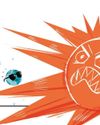
There's a flaw in the healthcare system and it's having dire consequences for women. It's the fact that pain in women is more poorly understood, compared to pain in men and is thus mistreated. It's known as the gender pain gap, and it's widening. A recent report by Nurofen showed that in 2023, 11 per cent more women than men felt their pain had been ignored or dismissed, compared to 7 per cent in 2022.
The report surveyed more than 5,000 people, with a near 50:50 split between men and women. It found that it takes UK women longer than men to receive a medical diagnosis for the same types of pain. 47 per cent of women surveyed received a diagnosis within 11 months, compared to 66 per cent of men.
Additionally, more women than men (14 per cent vs 9 per cent) still didn't have a diagnosis for their pain after 12 months or longer. And a third of women felt the delay in diagnosis was because they were not listened to, or taken seriously by their healthcare professionals, or, worse still, completely dismissed.
Similarly, in a survey of over 110,000 women taken in 2021 for the Government's Women's Health Strategy, 50 per cent of women felt their pain was ignored and/or dismissed. This dismissal was often coupled with being told that certain symptoms should be accepted as inherent to being a woman, and therefore didn't require treatment. This was particularly prevalent in relation to menstrual health.
This story is from the New Year 2024 edition of BBC Science Focus.
Start your 7-day Magzter GOLD free trial to access thousands of curated premium stories, and 9,000+ magazines and newspapers.
Already a subscriber ? Sign In
This story is from the New Year 2024 edition of BBC Science Focus.
Start your 7-day Magzter GOLD free trial to access thousands of curated premium stories, and 9,000+ magazines and newspapers.
Already a subscriber? Sign In

NOW YOU SEE ME, NOW YOU DON'T
Scientists around the world are working on ways to hide us from sight. But how close are we to developing tech that could make us invisible?

UNCORKED POTENTIAL
How much good can ditching drink for a month really do? Answer: a whole lot. In fact, science shows even short-term abstinence could unlock a cocktail of lasting benefits

Scientists discover when humans and dogs became friends
The relationship spans thousands of years, but experts might have pinpointed the first connection

Why it's so hard to kick a gambling addiction
We now know that gambling can be as addictive as drugs, but there are factors that can make it even harder to quit

How much could Ozempic change our world?
The weight-loss drug has made headlines and broken sales records, but what does it mean for our future?

WHY DOES DRINKING ALCOHOL MAKE IT SO MUCH HARDER TO LOSE WEIGHT?
While enjoying the occasional glass of wine or pint of beer may seem harmless, regular or excessive alcohol consumption can significantly hinder your weight-loss journey for a few reasons:

Why do so many New Year's resolutions fail?
Establishing positive new habits is hard at any time of year. But there are ways to stop your attempts ending in failure

'Extreme' solar radiation storm could hit Earth
Sun-like stars may have tantrums far more frequently than we thought

HOW CAN I BANISH THE JANUARY BLUES?
Dark mornings, long chilly evenings and short days; many people find January tough.

Neutrinos are getting in the way of dark matter detection
These troublesome particles are difficult to detect, but they're starting to show up in places where they're not wanted